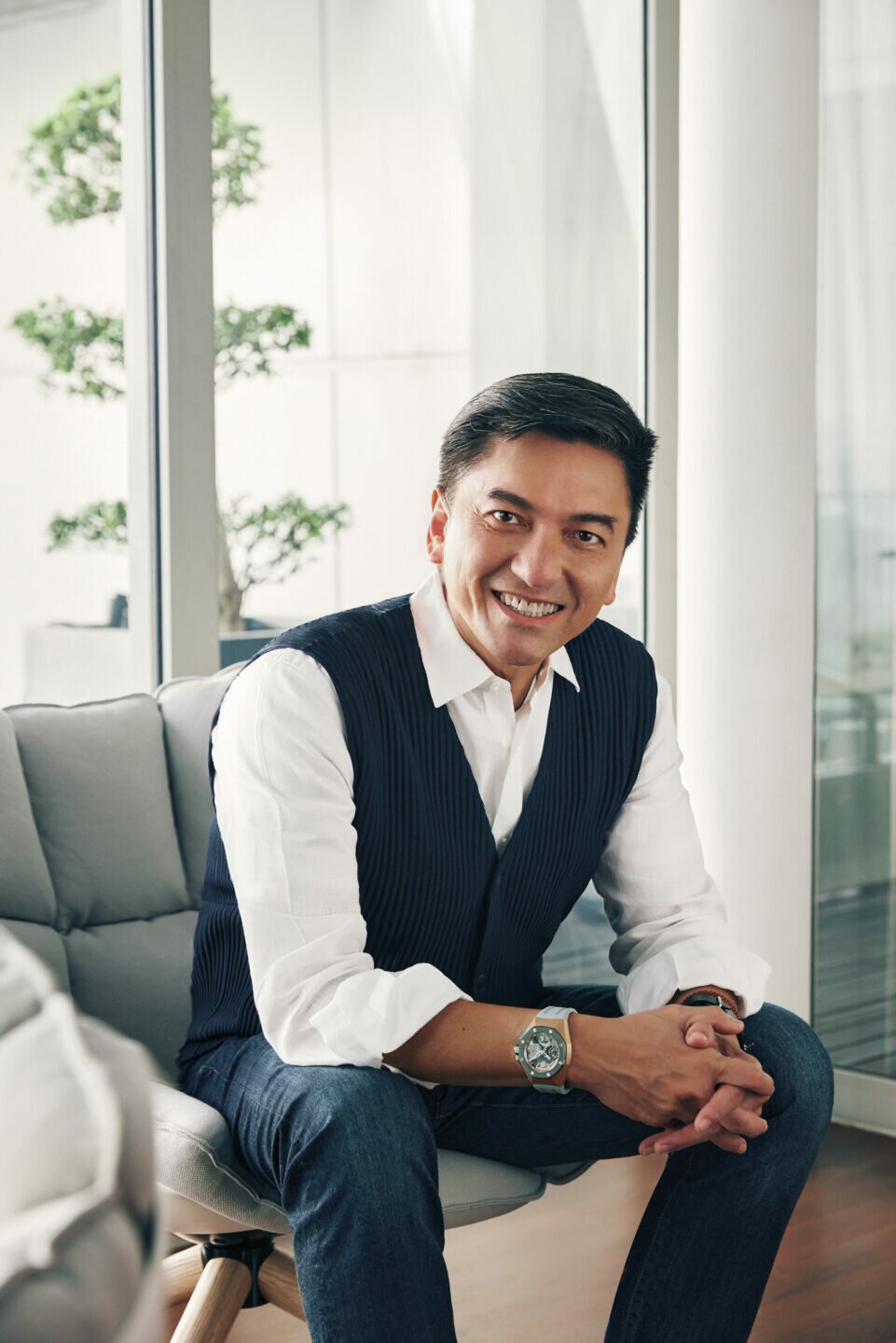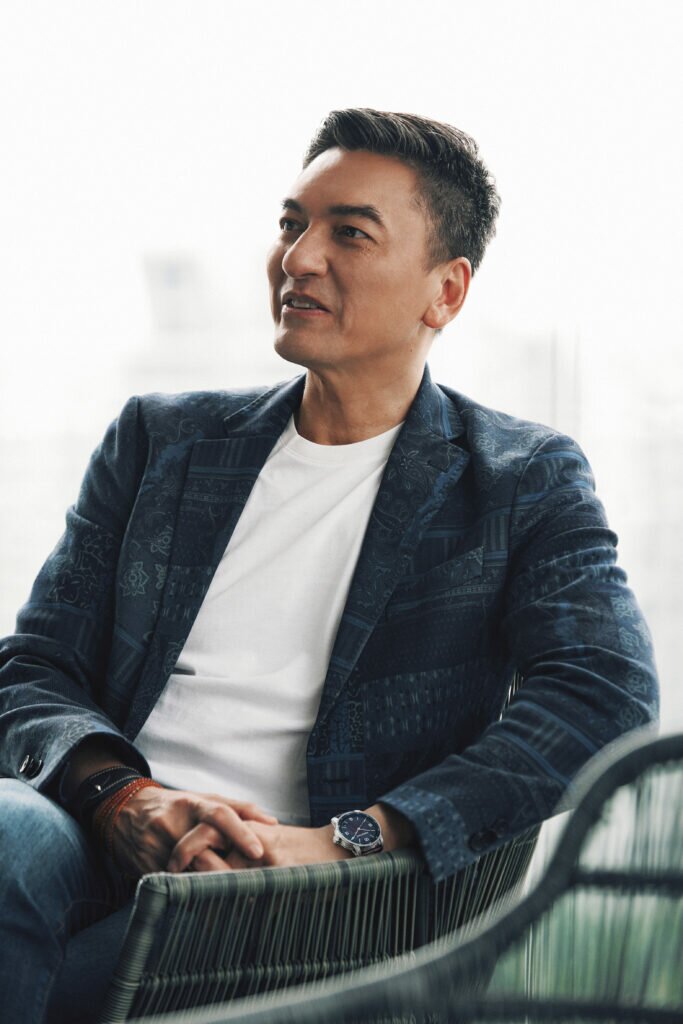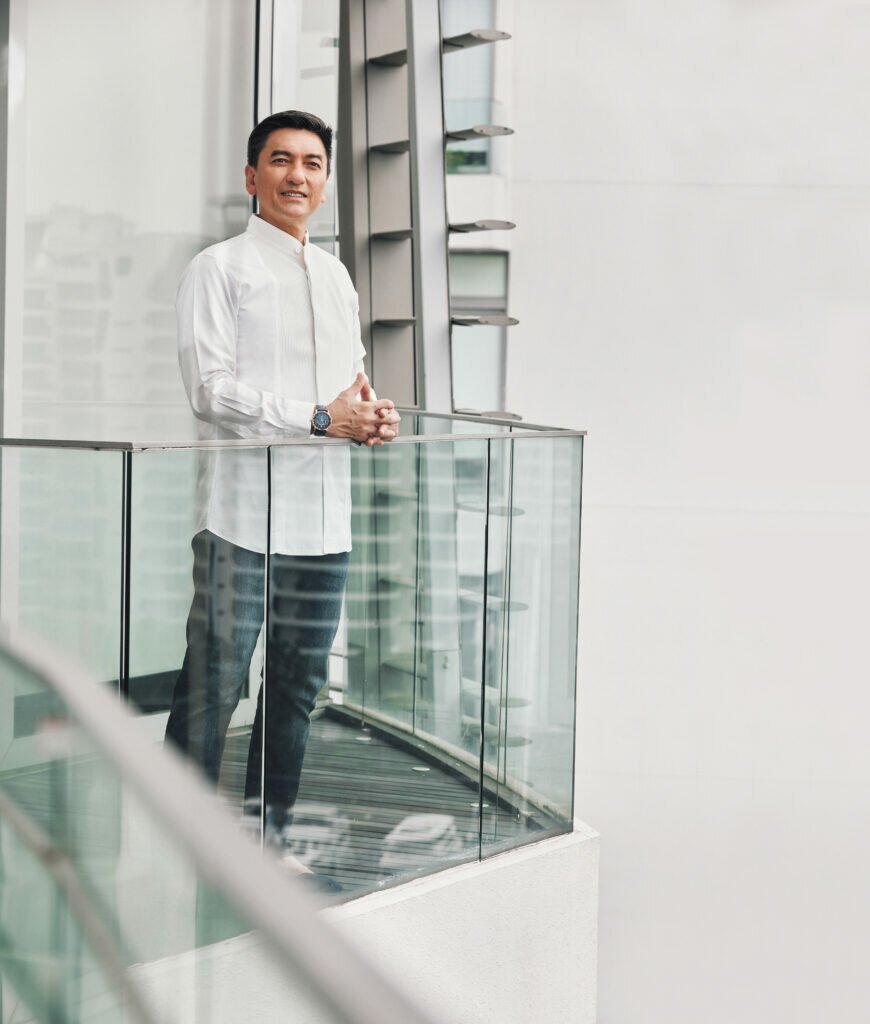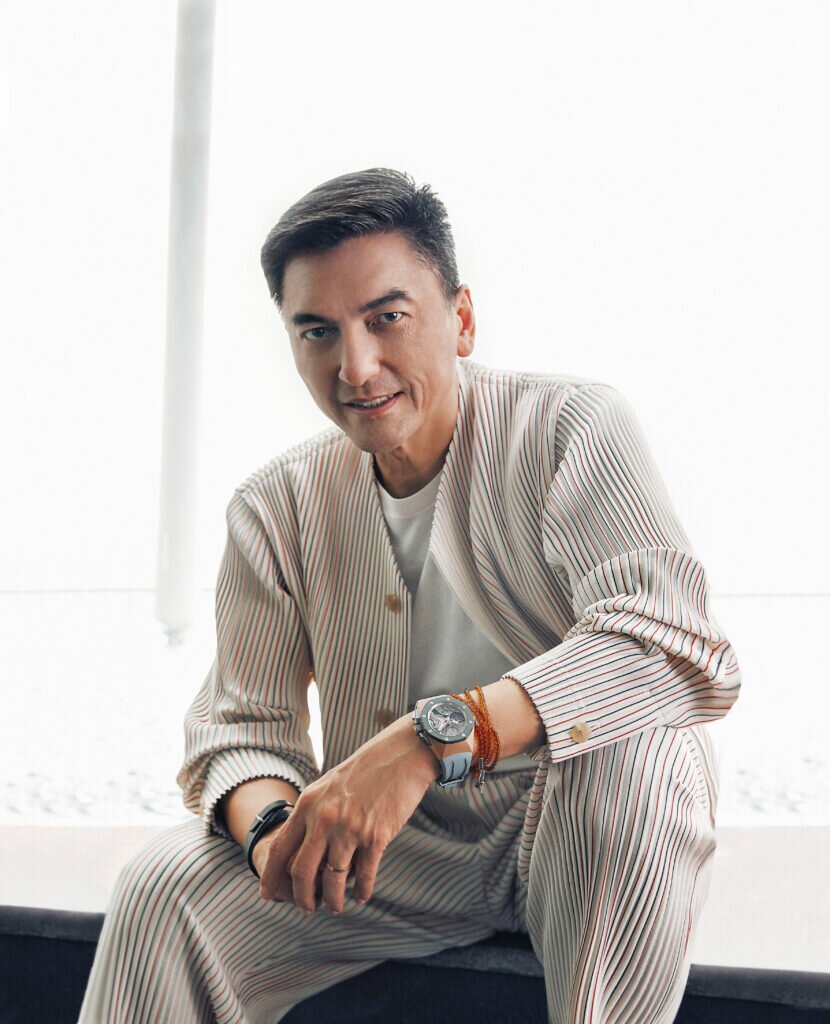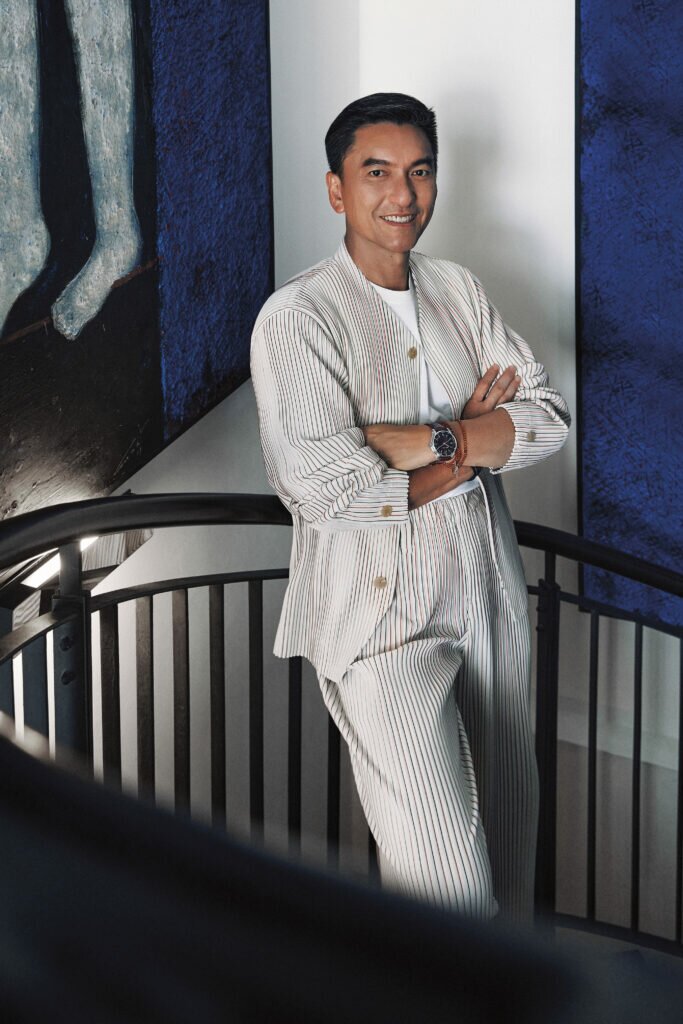Sporting a vibrant Dolce & Gabbana tee, Finian Tan looks tanned and fit as he steps off his Segway and onto his 64-footer power catamaran, as it bobs gently on the waters of One15 Marina in Sentosa Cove.
He comes across as a relaxed, self-confident individual, but also someone who’s unafraid to take a risk or two in life. It’s no wonder they say success breeds confidence: Tan’s life has been a pretty impressive string of successes, despite not always following the most conventional of paths.
Top of the class at university, a former squash player for his college, winner of two scholarships to Cambridge University, a high-profile spell working for the Singapore government and stints with Goldman Sachs and Shell, Tan hasn’t made too many missteps along the way to becoming an entrepreneur-philanthropist and the founder and chairman of Vickers Venture Partners, one of the world’s leading investment companies.
Yet, it was one of the few failures that Tan experienced as a child that ultimately set him on this outstanding career path. Born to Peranakan parents, the young Tan didn’t speak Mandarin at home and never really bothered about it at school. Then at 15, he was informed that he would need to pass the language at school or it would be difficult to get into junior college and then a local university.
The pragmatic Tan decided he didn’t want to catch up on 10 years of second language curriculum, so looked for other options instead. That meant studying engineering — rather than law or medicine like his parents had wanted — the only option available at the time at a polytechnic, before heading overseas to Glasgow, Scotland, to complete his degree. He went on to Cambridge University before joining Shell and getting into the world of finance and investment.
Code 11.59 by Audemars Piguet Self-winding in white gold, from Audemars Piguet
“It’s ironic, if I hadn’t been bad at Chinese, I would have never ended up investing in Baidu,” he recalls with a smile, citing his most notable investment in the Chinese Internet behemoth during his time as managing director of the Asian arm of Silicon Valley investment firm Draper Fisher Jurvetson Eplanet. Today, Baidu is considered one of the best-performing IPOs on Nasdaq.
One of the main rules of Vickers, which Tan founded in 2005, is that they will no longer invest in anything that has market risks, and this includes all the B2C companies related to the Internet or social networks.
“They are money-burning projects, where the person with the biggest wallet wins, and we don’t have the biggest wallet,” explains the plain-speaking Tan of the company’s decision to focus instead on what he calls “Holy Grail” breakthrough technologies that can totally transform or solve major problems that exist today. “We want to fund projects that will make a better world.”
As a venture capitalist, he admits that there will always be an element of risk in this type of investment. But as he points out, the occasional failure is acceptable when you consider the rewards of funding a new cure for cancer or discovering a clean form of energy.
Tan reckons that he receives around 5,000 deals a year but only ends up picking around five, demonstrating the strict filters the venture capital firm applies to potential investments. It’s clear though that he loves this aspect of the job and derives immense pleasure from meeting with the entrepreneurs, hearing their ideas and working with successful candidates to help their companies grow and attract other investors.
Vickers has certainly had plenty of success on that front, with an impressive roster of potentially game-changing companies on its portfolio. They include Eavor, a Canadian-based geothermal technology company offering green energy solutions that has attracted the interest of big players like Temasek, BP and Chevron.
Then there’s the UK-based Emergex, which is working to develop a vaccine that employs synthetic components to target and prevent severe disease from RNA viruses, like dengue and Covid-19, more effectively than current vaccines.
Code 11.59 by Audemars Piguet Self-winding Chronograph in pink gold, from Audemars Piguet
“We actually invested in them pre-pandemic, we really felt that they were addressing a problem,” Tan says of this particularly prescient investment, before adding that the decision was made amid concerns among the Vickers team that some kind of pandemic was on its way.
Naturally curious, the evidence-based freethinker likes to read at least one book about a new subject each month (recently, it was Astrophysics for People in a Hurry by Neil DeGrasse Tyson) to get different perspectives on life — which also makes him engaging and erudite company. He’s more than happy to talk at length about everything from the possibilities of nanotechnology to the latest advancements in artificial intelligence.
However, while he clearly understands the technological side of things, the engineer-turned-investor makes it clear that it’s not a venture capitalist’s job to make predictions about the next big thing.
“Where the next breakthrough is going to be is anyone’s guess; you just can’t tell,” he explains, using the accidental discovery of penicillin as a classic example of the unexpected nature of scientific progress. “All we can do is identify certain real risks out there that we can try and do something to stop, like viruses, like climate change, and then try and help find solutions.”
One such global challenge is the issue of plastic waste, and it’s another area Vickers is making a difference. Last year saw the firm lead an additional US$133 million ($179.2 million) investment in RWDC, a Singapore- and US-based biotechnology company that is developing a fully biodegradable substitute for single-use plastics in the form of PHA. As he presents a spoon made from the ground-breaking material, it’s obvious that he is particularly proud of the company’s Singapore connection.
“It’s definitely punching above its weight when it comes to R&D,” states Tan when asked about Singapore’s potential to be at the vanguard of innovation globally.
Tan is well placed to comment, having spent time in the early 2000s as deputy secretary at the Ministry of Trade and Industry (MTI), where he was tasked with making the country a leader in technology and innovation.
He is refreshingly outspoken when voicing concerns that Singapore currently lacks the creativity and entrepreneurial spirit needed to thrive and grow within the parameters of a new global economy.
Royal Oak Concept Flying Tourbillon (SEA Limited Edition) in pink gold and ceramic, from Audemars Piguet; outfit, Finian Tan’s own
“We need to come up with a Singapore 2.0 and we don’t have it right now,” Tan proclaims, highlighting the potential limitations of the long-term government policy of attracting multinational corporations (MNCs) with the promise of a safe place to do business and access to a clever, disciplined, obedient labour force.
“At the moment, we are importing our economy, importing our GDP, but that means we don’t yet know how to create our own.”
One of his biggest concerns is the risk-averse attitude among many Singaporeans, one he doesn’t share. Tan feels that part of the blame for this is down to a system that is focused on breeding employees rather than employers. For example, he feels that the current system of offering scholarships to Singapore’s brightest young talent but which ties them to government roles for five to 10 years could be changed to a bond to Singapore or Singapore companies instead.
“It engenders an employee mindset, not an employer mindset,” explains the man who has set up numerous companies of his own. “After 10 years, it’s hard to break out of that, and they become risk averse as a result.”
Put simply, he doesn’t believe that Singapore’s current ecosystem is designed to let people try and fail. He uses the analogy of a lion in the zoo. It’s not a question of having to teach the lion how to hunt — that’s innate — but instead giving them an environment that allows them to go out and hunt for themselves. Once you feed the lion, he can no longer survive in the wild.
“Sure, there will be accidents, some lions will die, there will be lots of wastage, things won’t happen as planned, but that’s just life,” he continues, pointing to Silicon Valley as the best example of a more chaotic approach. Companies fail there all the time, but it is also the birthplace of Amazon and Facebook, organisations that are now more successful and powerful than many countries.
It was the lure and the growth potential of the Internet and China that led him to return to the private sector after three and a half years in his government role.
“I wanted to do a lot, but I was just a referee, I wasn’t a player,” he recalls of that period. “Luckily, I was still young enough to get back in the game — I wanted to be a player again.”
It’s another example where he admits to being thankful in hindsight, as the first thing he did when he got back in the game was to invest in Baidu. Perhaps, just as important for Tan, becoming a venture capitalist also allowed him to get to know and understand how things really worked in Silicon Valley.
Pre-pandemic, he spent a lot of time in the US for work, so much so that he was in the middle of building his own house in Los Angeles, a project that’s currently on hold until he can get back and oversee the construction. Chatting about how the last 12 months have affected his work and personal life, it’s apparent that he’s missing the energy and mindset of California.
“When I have lunch with friends in Singapore, we talk about house prices, politics; when I have lunch with friends in California, many are talking about changing the world,” he says with a grin, though you get the feeling that he’s not completely joking.
Making a difference and leaving his mark on the world is clearly of major importance to the father of eight, which includes quadruplets (three by surrogates) under the age of two. Inspired by Bill Gates and Warren Buffet, he has publicly announced that he wants to give away the majority of his wealth; in 2018, he set up the Finian and Fiona Tan Foundation with his wife.
“Once we made that decision, then it’s really just a question of execution: what is the best way to do it efficiently,” he explains, before pointing out the similarities of investing in charitable organisations and his work with impactful companies through Vickers.
The foundation started with a million-dollar commitment to local theatre company Wild Rice, and has subsequently funded Action for Dolphins in Australia and Charity: Water, which aims to bring clean and safe drinking water to people in India and Africa, and the Musical Theatre Factory in New York.
“The arts, education, animals — we want to support things we are personally interested in and passionate about,” explains the keen musician, who plays the saxophone, guitar and piano, and even had a spell as choirmaster at church.
His four older sons have taken up the musical legacy and perform together on YouTube, though dad admits it’s his eldest, a climate activist, who is probably the most serious and has dreams to release an album. Each is pursuing his own passions and unlike the stereotypical Singaporean parent, Tan is evidently relaxed about their futures.
“You can only really try and imbue them with a sense of curiosity,” he explains of his paternal approach. “Try and teach them that they owe it to the world to leave it a better place than when they came into it in whatever way that they see fit.”
Where the next breakthrough is going to be is anyone’s guess; you just can’t tell. All we can do is identify certain real risks out there that we can try and do something to stop, like viruses, like climate change, and then try and help find solutions.”
Finian Tan
A desire to give his younger children, three boys and a girl, a more global perspective on life is evident in the fact that he has employed four nannies who speak four different native languages, with each one instructed to only speak their mother tongue to the kids.
“It’s a bit of an experiment,” he admits with a laugh. “But it does mean I don’t always know what’s going on in my house!” It’s certainly interesting that he puts such importance on language after his own experience with Mandarin as a child; for the record, he can now speak Mandarin and Japanese pretty fluently.
All this talk of family leads to talk of the future. Having turned 59 in March, he’s already stated that he wants to be less involved in the day-to-day operations of Vickers and to focus more on his foundation by the time he is 70. However, he has no plans to stop investing, arguing that it’s through these investments that he can really leave a positive legacy on the world.
“I don’t invest just for money,” he concludes. “By investing, I can really make a big impact. I have the potential to change the world for the better.”
Based on his stellar track record, you can bet on him succeeding.
Art direction by Catherine Wong, photography by Darren Gabriel Leow, hair & grooming by Angel Gwee using Fenty Beauty and L’Oreal Professionnel, photography assistance by Melvin Leong
This story first appeared in the April 2021 issue of A Magazine.
